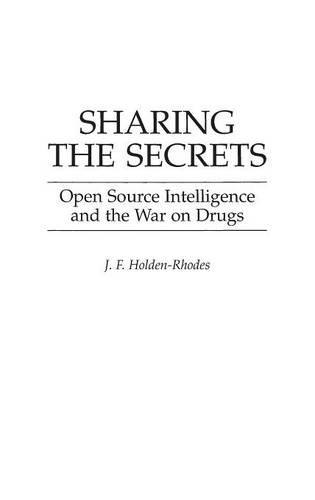
Sharing the Secrets: Open Source Intelligence and the War on Drugs
(Hardback)
Publishing Details
Sharing the Secrets: Open Source Intelligence and the War on Drugs
By (Author) J. F. Holden-Rhodes
Bloomsbury Publishing PLC
Praeger Publishers Inc
28th January 1997
United States
Classifications
Tertiary Education
Non Fiction
Drugs and alcohol: social aspects
Central / national / federal government policies
364.177
Physical Properties
Hardback
256
Description
Against the backdrop of U.S. drug policy and strategy, this important work, written by an experienced Intelligence and Special Operations Officer and Scholar, peels away the rhetoric to present an insider's view of cocaine trafficking in the Western Hemisphere. From the Huallaga and Chapare Valleys, through the cocaine transit countries to the U.S. border, this book compares and contrasts the enormous success of the traffickers to the monolithic U.S. drug policy that produces no end-game and conceals its failures behind a classified stamp. Drawing on his experience as the Counter Drug Intelligence Team Leader at Los Alamos National Laboratory and as a Black Hat Team member with the U.S. Southern Command, the author approaches drug trafficking from the narcotraficantes point of view to paint a picture that portrays the cocaine industry as it really is. Arguing that it is impossible to stop drugs at their source, the author builds a compelling case for shifting U.S. assets to the southern borders of the United States, through a strategy that causes the traffickers to pass through a series of obstacles designed to slow and impede their operations. Identifying drug trafficking as an examplar of the Gray Area Phenomenathe impact of non-state players and organizations on a post-colonial, multi-tribal worldthe author brings a currency to his work using Open Source Intelligence as the vehicle by which the drug trafficking world may be assessed and analyzed. Sharing the Secrets offers an Intelligence for the new world disorder that enables decision-makers to recognize and define the new threats and suggests how realistic policy and strategy might be evaluated and re-cast. This work will be of particular interest to policy-makers, law enforcement and Intelligence professionals, and scholars as it opens the book to the right page and provides for the first time the stubborn facts that they may have been neglecting in the war on drugs. Sharing the Secrets is a body of descriptive, proscriptive, and prescriptive material that will enable serious public discusion to begin on national drug policy and strategy.
Reviews
Arguing the impossibility of stopping drugs at their source, the book builds a compelling case for shifting U.S. assets to the southern borders of the United States through a strategy that causes the traffickers to pass through a series of obstacles designed to slow and impede operations.-Violence and Abuse Abstracts
The book provides an intellectual foundation for unclassified intelligence work by using the National Drug Control Strategy as an example of the dangers of not sharing intelligence and information between different government and anticrime agencies with related missions....This textbook could usefully serve as a case study reader for upper-level or graduate courses in narcotics or police work for for a law and government ethics course. I hope that the author, who sharply but scrupulously catalogues the events, policy decisions, and outcomes on the war on drugs, will write a follow-up book using a decision model to explain the failure to curtail narcotic smuggling into the United States.-Criminal Justice Review
"Arguing the impossibility of stopping drugs at their source, the book builds a compelling case for shifting U.S. assets to the southern borders of the United States through a strategy that causes the traffickers to pass through a series of obstacles designed to slow and impede operations."-Violence and Abuse Abstracts
"The book provides an intellectual foundation for unclassified intelligence work by using the National Drug Control Strategy as an example of the dangers of not sharing intelligence and information between different government and anticrime agencies with related missions....This textbook could usefully serve as a case study reader for upper-level or graduate courses in narcotics or police work for for a law and government ethics course. I hope that the author, who sharply but scrupulously catalogues the events, policy decisions, and outcomes on the war on drugs, will write a follow-up book using a decision model to explain the failure to curtail narcotic smuggling into the United States."-Criminal Justice Review
Author Bio
J. F. HOLDEN-RHODES is a former serving Officer in the U.S. Marine Corps and U.S. Army where he held Reconnaissance, Infantry, Special Forces and Intelligence positions./e He was appointed as a Post-Doctoral Fellow at Los Alamos National Laboratory, and also served as Member of Laboratory Staff, Sandia National Laboratories. He is presently an Adjunct Professor at the University of New Mexico where he teaches and writes in the areas of Intelligence, National Security, and Military History.
